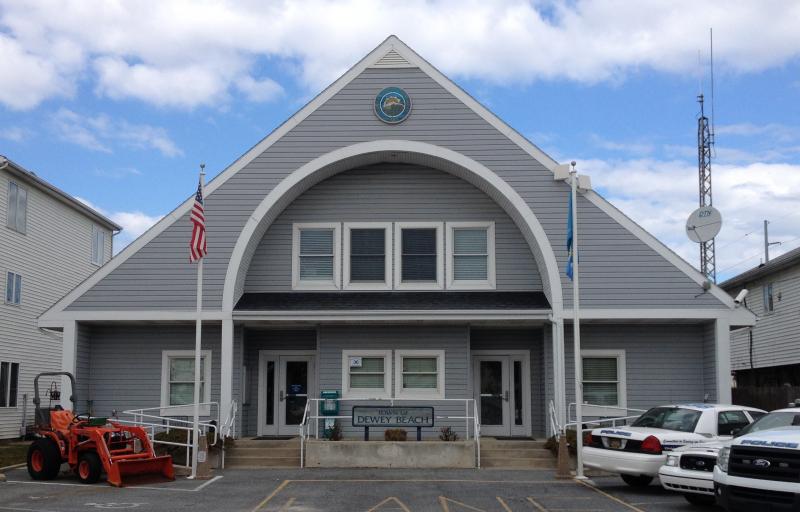Dewey officials work to recoup missing revenue from rentals
To educate property owners not in compliance with licensing and tax requirements for rental properties, Dewey Beach commissioners voted unanimously March 18 to purchase software designed to do just that while capturing missing revenue for the town.
All owners who rent their properties must purchase a residential rental license and pay 3 percent accommodations tax on those rentals to the town each year, per town code.
About 80 percent of Dewey Beach property owners have a primary residence elsewhere, and 37 percent of properties have a rental license, said Dewey Beach Administrative Assistant Kate Banaszak. The entire 80 percent of those properties aren’t rentals, Banaszak said, but the town is likely missing revenue.
In all, 1,630 residential parcels are in town, Banaszak said, but each parcel could have several rentable structures. In 2019, the town had 603 licensed rentals, in 2020 there were 539, and in 2021, there were 611 after Banaszak said she caught 42 renting without a license and brought 31 into compliance.
Banaszak said she performed a quick Google search and located 776 rentals listed in Dewey; some could be duplicates, she said.
The rental license fee starts at $142 and rises incrementally based on the number of bedrooms, bringing the average fee to $154. That said, the town is possibly missing $25,410 in rental fees, Banaszak said. The average accommodations tax is $1,100, so the town is potentially short $181,500 in unpaid taxes, she said.
Tracking down those not in compliance is very time-consuming and the town currently operates on an honor system, Banaszak said. After reviewing several potential software companies to perform the tax, Banaszak said GovOS would best meet the town’s needs.
Four modules are available and can be utilized stand-alone or all together, Banaszak said. For $14,000 annually, the identification and compliance module would scan ad listings and rental companies online to create a database that matches listings and addresses, building an evidence file to present to property owners to enforce payment of licenses and fees.
Registration and tax filing modules would be $9,819 each, and a hotline for tenants or residents to report violations or complaints about a property would be $6,334. The total of all modules would be $40,000, which is non-budgeted.
In years past, Commissioner David Jasinski said, interns have combed sites to track people down, which has been effective. The best way to ensure compliance with taxes is a penalty system for those who don’t pay, he said. He said he was concerned about adding to the budget and suggested hiring a student to perform the task over the summer and possibly purchasing the software next year.
Commissioner Gary Persinger said he saw possible value in the identification and compliance module, and asked for the company’s success rate. Commissioner Elisabeth Gibbings said she liked the idea of trying the identification and compliance module to start. If the town recoups just one-third of Banaszak’s predictions, it would pay for itself, she said. Mayor Bill Stevens and Commissioner Paul Bauer said they agreed.
GovOS account representative Blake Jetton said most municipalities start at about a 60 percent compliance rate with property owners and by the end of a year, 90 percent are in compliance. The City of Dallas recovered $7 million its first year, he said.
Town Manager Bill Zolper said he recommended the entire package. Bauer said he felt comfortable the software would pay for itself and motioned to approve the $40,000 software, but it failed without a second. Jasinski’s motion to purchase the $14,000 identification and compliance module passed unanimously.
Other actions taken March 18
Commissioners voted unanimously to approve purchasing a $9,897 sweeper box for the town Kubota tractor. The box will sweep sand on town streets into a bucket for return to the ocean and bay beaches.
Commissioners also voted unanimously to make permanent a temporary change to parking permit fees initiated last year. Visitors can now purchase a four-hour permit Monday through Wednesday for $10 and a four-hour permit Thursday through Sunday for $12.
An electric vehicle charging station may be coming to town. Zolper said he spoke with Electric Vehicle Institute regarding placement of a station. The company, also used by the town of Bethany Beach, would install and construct the station, and profits would be split between the company and town, Zolper said.
Three architectural firms will submit their credentials and information regarding a new town hall and police department by April 1, Zolper said, with a presentation set for the May commissioners meeting.
Zolper said he considered a solicitation by a third party interested in offering half-hour camel rides on the beach, but decided against it after considering the safety of the rider, the safety of people on the beach, how the camels would affect dogs that are allowed on the beach, and health concerns regarding waste cleanup.
In what would be a public safety benefit to visitors and residents this summer, Sussex County paramedics may set up a location during day hours in a town building located behind code enforcement, Zolper said, noting he is waiting for Sussex County to hire an attorney to draw up an agreement for the town to review and sign.

















































